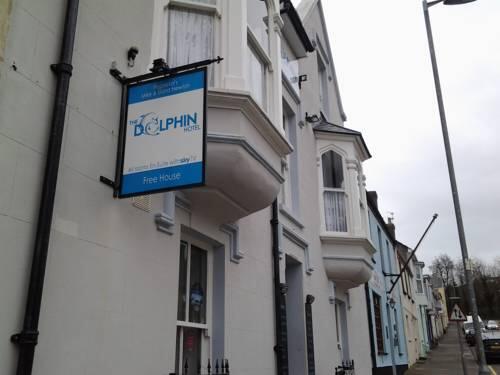Business
Milford Haven: Wales’ energy hub embraces green transformation

ONCE synonymous with oil and gas, Milford Haven is now poised to lead Wales into a cleaner, greener future—powered by hydrogen.
Green energy pioneer Haush Ltd has chosen Milford Haven as the location for its new UK headquarters, marking a significant step towards establishing the area as a hub for hydrogen innovation. The company’s ambitious plans aim to decarbonise land, sea, and air transport, while also exporting green hydrogen to Europe.
Backed by the Welsh Government through the HYBRID SBRI Hydrogen Port Re-Fuelling Project (HyPR), Haush’s initiative will kick off immediately. The HyPR project supports trials to accelerate hydrogen production and create refuelling solutions for both onshore and offshore vessels. A key part of this effort is designing a permanent hydrogen refuelling infrastructure at the Port of Milford Haven, unlocking its potential as a green energy leader.
For over 65 years, Milford Haven has been a cornerstone of the UK’s oil and gas sector, processing 20% of the nation’s oil and gas. Now, this latest investment signals the beginning of a transformative shift toward renewable energy.
Welsh Government Economy, Energy, and Planning Cabinet Secretary, Rebecca Evans, welcomed the move, saying:
“Jobs and green growth are a priority for this Welsh Government, so I am delighted that Haush has chosen Milford Haven as the base for its new UK headquarters. The company’s ambitious growth plans align perfectly with our aspirations to see Wales become a global leader in renewable energy generation.”
Milford Haven’s journey from oil and gas to hydrogen innovation could set a blueprint for green energy transformation in the UK and beyond.
Business
Pembroke Dock restaurant to close on Christmas Day after £23,000 rates rise

A PEMBROKE DOCK restaurant owner has said she is “devastated” after being forced to close her business on Christmas Day following a projected business rates increase of more than £23,000.
Randalls Restaurant, which operates from The Dolphin Hotel in Pembroke Dock, has been run by Natalie Newton and her family since 1999. Ms Newton took over the business in 2018 after her parents retired, overseeing a major transformation from a traditional pub and bed and breakfast into a hotel and restaurant.

For the past seven years, she and her fiancée, chef Ben Randall, have worked to build the restaurant’s reputation, offering breakfasts, lunches and evening meals using locally sourced produce where possible, as well as hosting special events including Christmas parties, buffets, afternoon teas and themed dining nights.
However, Ms Newton said she was left with no option but to close the restaurant after discovering that its business rates are expected to rise from around £10,000 to £33,000 from next year.
She said: “It’s a great shame. My father is absolutely devastated – this was his legacy. I took it over and built a really successful restaurant, and now it feels like it’s been taken away.”
Ms Newton said she checked her projected rates bill using the Government’s online calculator and was shocked to see that it had more than trebled. With quieter trading months expected early in the year, she said the increase was simply not sustainable.
“January, February and March are quieter months,” she said. “From April I’d need to find an extra £2,750 every month. Even if I managed it, I’d be working for nothing, and I’m worried I wouldn’t be able to pay my bills and would end up in the red.”
She added: “I’ve made the decision to close straight after Christmas Day. It’s drastic, but I have to keep my head above water and protect everything my parents worked for.”
Ms Newton said the decision had not only affected her family but also the restaurant’s eleven members of staff.
“I’ve invested everything back into this business,” she said. “Every penny the restaurant has made has gone straight back into it. I’ve worked every day, nights and weekends, and I haven’t had Christmas at home for seven years.
“For the last six months I’d look around the restaurant when it was busy and think how lucky we were. People were happy, good food was going out. Now it feels like it’s all been snatched away.”
The Herald has reported extensively on growing concern among Pembrokeshire businesses over sharp increases in business rates following updated valuations, with several town centre traders warning that rising fixed costs are pushing otherwise viable businesses to the brink.
Ms Newton said she intends to focus on running the hotel after Christmas but will miss the restaurant and its customers.
“I’m going to miss everyone,” she said. “I’ve loved building relationships with customers over the years. I just want to thank everyone who believed in Ben and me and supported us.”
Business rates in Wales are due to be updated from April 1, 2026, to reflect current property values. The Welsh Government has said that while many businesses will see their bills fall, others will face increases.
It has announced that any business facing an increase of more than £300 will have the rise phased in over two years rather than being applied in full immediately.
Cabinet Secretary for Finance and Welsh Language Mark Drakeford said previously: “We know businesses have faced significant economic challenges in recent years. This support package will help them manage the transition to updated rates bills while we deliver on our commitment to a fairer rates system.”
Business
Salon plans for Haverfordwest car valet site approved

RETROSPECTIVE plans to change a Pembrokeshire car sales/valet area to include a barber shop and tanning salon have been given the go-ahead.
In an application to Pembrokeshire County Council, Zizo Barbers & Affordable Cars, of Cambrian Place, Haverfordwest sought permission for the change of use of previously granted valet and car sales area, the works completed in 2024.
A supporting statement through agent Hayston Developments & Planning Ltd said the former commercial garage business has been operating in several guises from the premises for many years and has included petrol sales, motor servicing and repairs, MoTs, vehicle valeting, car sales and customer parking.
This followed on from a 2011 permission for the partial demolition of the original commercial garage, with a later approval for the site refurbishment to provide a workshop, valeting and offices for the existing car sales.
A supporting statement said: “The proposed update to a change of use involves the replacement of a car valeting service, which took place under a covered area at the rear of the site by a wash and valet operation – and restricting this service to those cars being sold at the Cambrian Place site. The use of a former office / store as a barber shop.
“The use of the former customer waiting area as a tanning salon including a new moveable timber shed for use as a meet and greet facility and as a car sales office. Provision of a communal parking area. Whilst retaining the principal use of the site for the sale of used cars.
“It is therefore suggested that the proposal will reduce both the elements of noise and the generation of dust whilst improving air quality as substantially fewer cars being power washed and valeted as well as the visual impact of these activities in this very public location – and with adjacent residential properties.”
Haverfordwest Town Council had objected to the scheme on highway safety grounds, but an officer report recommending approval said: “Highways colleagues have advised that the mixed use at the site is not likely to generate a significant number of trips that would lead to congestion and/or road safety issues due to the hours of operation are suggestive of visitors in the non-peak hours over the course of the day.
“In addition, highways colleagues have confirmed recorded accident history is negligible at the site, with one accident in 2023 at the nearby junction as a result of a rear shunt.”
It also said that, as the site lies adjacent to the A40(T) Welsh Government as a highway authority were consulted on the application, but has not not issued a direction in respect of this application.
One letter of objection had also raised issues of traffic and highway safety, chemical and detergent waste from the site and occasional activity after 5pm.
The report said the cessation of the valeting/washing use will reduce water usage at the site and any activity outside normal hours was an enforcement matter.
The application was conditionally approved by officers.
Business
Community council objections to Tenby Lidl store scheme

PLANS for a new store on the edge of Tenby by retail giant Lidl, which has seen objections from the local community council, are likely to be heard next year.
In an application recently lodged with Pembrokeshire County Council back in October, Lidl GB Ltd, through agent CarneySweeney, seeks permission for a new 1,969sqm store on land at Park House Court, Narberth Road, New Hedges/Tenby, to the north of the Park Court Nursing Home.
The proposals for the latest specification Lidl store, which includes 103 parking spaces, would create 40 jobs, the applicants say.
The application follows draft proposals submitted in 2024 and public consultations on the scheme, with a leaflet drop delivered to 8,605 local properties; an information website, with online feedback form; and a public exhibition, held last December at the De Valence Pavillion in Tenby, with a follow-up community event held at New Hedges Village Hall, close to the site, publicised through an additional postcard issued to 2,060 properties.

Some 1,365 responses have been received, with 89 per cent of respondents expressing support for the proposals, the applicants say.
A supporting statement says: “Lidl is now exceptionally well established in the UK with the Company operating c.980 stores from sites and premises both within and outside town centres. Its market share continues to increase substantially, and the company is expanding its store network considerably. The UK operational model is based firmly on the success of Lidl’s operations abroad with more than 10,800 stores trading across Europe.
It adds: “The granting of planning permission for the erection of a new Lidl food store would increase the retail offer and boost the local economy. The new Lidl food store would create up to 40 employment opportunities for people of all ages and backgrounds, providing opportunities for training and career development. This in turn will create an upward spiral of economic benefits.”
Local community council St Mary Out Liberty Community Council has formally objected to the scheme, saying that, while it supports the scheme for a Lidl store in principle, recognising “the economic benefits a new retail store could bring,” it says the proposed location “is unsuitable, conflicts with planning policy, and cannot be supported in its current form”.
Its objections add: “The A478 is heavily congested in peak tourist months. A supermarket would worsen congestion, increase turning movements, and heighten risks to pedestrians, cyclists, and emergency access.”
It also raises concerns on the potential impact through “noise, lighting, traffic disturbance, and loss of quiet amenity” on a neighbouring residential care home.
An initial assessment by Pembrokeshire County Council, highlighted concerns about the visual impact, with the authority’s landscape officer commenting that the store would introduce “an intense urban function into an otherwise rural context”.
The report added: “It is not considered to be compatible with the character of the site and the area within which it is located; and furthermore, will lead to a harmful visual impact on the setting of the National Park.”
The application will be considered by county planners at a later date.
-

 Crime3 days ago
Crime3 days agoMilford Haven man jailed after drunken attack on partner and police officers
-

 News6 days ago
News6 days agoDyfed-Powys Police launch major investigation after triple fatal crash
-

 Crime3 days ago
Crime3 days agoTeenager charged following rape allegation at Saundersfoot nightclub
-

 Crime4 days ago
Crime4 days agoMan charged with months of coercive control and assaults
-

 Crime5 days ago
Crime5 days agoMan sent to Crown Court over historic indecent assault allegations
-

 Crime7 days ago
Crime7 days agoMan spared jail after baseball bat incident in Milford Haven
-

 Crime5 days ago
Crime5 days agoMilford Haven man admits multiple offences after A477 incident
-

 Crime4 days ago
Crime4 days agoWoman ‘terrified in own home’ after ex breaches court order




















